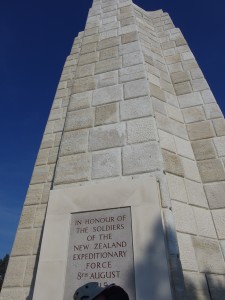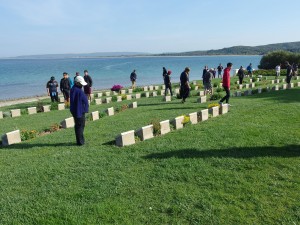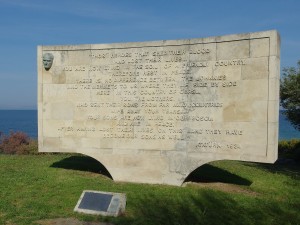Posts Tagged ‘Anzac Day’
At Gallipoli
The Anzac Day memory floats up from my childhood: gray dawn in a small New Zealand town, plod and shuffle of marching feet, old men in uniforms button-stretched across their chests. The oldest of the veterans lays a wreath at the foot of a cenotaph where names are inscribed: casualties of the First World War.
When the war started in 1914, New Zealand was a British colony of less than a million people. Eager to come to the aid of the mother country in her time of need, more than 100,000 men signed up, and well over half of these were killed or wounded. A place name that crops up often on the marble tablets of small New Zealand towns is Gallipoli, Turkey. Seeking to take Constantinople, Winston Churchill, who was then First Lord of the Admiralty, sent the Australia and New Zealand Expeditionary Force (the ANZACs) to storm the Gallipoli Peninsula, which overlooks the Dardanelles, a channel connecting the Aegean Sea to the Sea of Marmara and the Black Sea. Writing in Slate, journalist Andrew Curry comments: “Though Gallipoli was a small conflict compared with landmark battles of the first world war like the Somme, the battle for the narrow peninsula contains the story of the war in microcosm: the fatal bravado, the futile fighting, the error-prone assumptions made by politicians and generals, and the killing fields that decimated a generation of young men.”
At dawn on April 25, 1915, the ANZACs landed at a small cove surrounded by steep cliffs. They met stiff resistance from Turkish troops. For nearly nine months the two sides fought and died, until finally the ANZACs withdrew. The website for the New Zealand Ministry for Culture and Heritage comments: “It may have led to a military defeat, but for many New Zealanders then and since, the Gallipoli landings meant the beginning of something else – a feeling that New Zealand had a role as a distinct nation, even as it fought on the other side of the world in the name of the British Empire.”
The rugged landscape of the peninsula is now a Turkish national park, filled with cemeteries and monuments to the dead of both sides. I was there last week, almost ninety-nine years after that tragic venture. At every memorial site, huge semi-circles of temporary bleachers were being set up for the Anzac Day ceremonies, which will be attended on April 25 by tens of thousands of Turks, Australians and New Zealanders.
With us also at Gallipoli last week was a group of New Zealand high school students. We had met them the previous day in Troy where, in the shadow of a modern Trojan Horse sculpture, and with “ancient Greek” costumes rented from a nearby stall, they were having an exuberantly good time re-enacting battle scenes from Homer’s Iliad.
This day at Anzac Cove the mood was markedly different. With solemn steps the students inspected the graves, where the ages of the dead were little different from their own: seventeen, eighteen, twenty-four. One young man passed out red lapel poppies to visitors, including our American tour group. We watched as one by one the students approached the cenotaph, placed their poppy at its base, and stood a moment with bowed head.
A New Zealander by birth, I have not lived in my home country for fifty years. Nevertheless, that day of pilgrimage I carried with me a small New Zealand flag. Following the students’ example, I attached my poppy to the flag and placed them both in the drift of red poppy emblems that lay like fallen petals at the cenotaph’s base. I thought of the stories from Gallipoli of Turkish and ANZAC soldiers who bombed each other by day and in the evening shared cigarettes and rations and helped tend each other’s wounded. I thought of the kindness of our Turkish tour guide who reorganized the tour schedule so that my husband and I could visit the New Zealand memorial site. I thought of the words of Mustafa Kemal Ataturk, who led the Turkish troops, and later went on to become the founder of the Turkish Republic. They are engraved in stone at Gallipoli:
Those heroes that shed their blood
And lost their lives.
You are now lying in the soil of a friendly country.
Therefore, rest in peace.
There is no difference between the Johnnies
And the Mehmets to us where they lie side by side
Here in this country of ours,
You, the mothers,
Who sent their sons from far away countries
Wipe away your tears,
Your sons are now lying in our bosom
And are in peace
After having lost their lives on this land they have
Become our sons as well.


